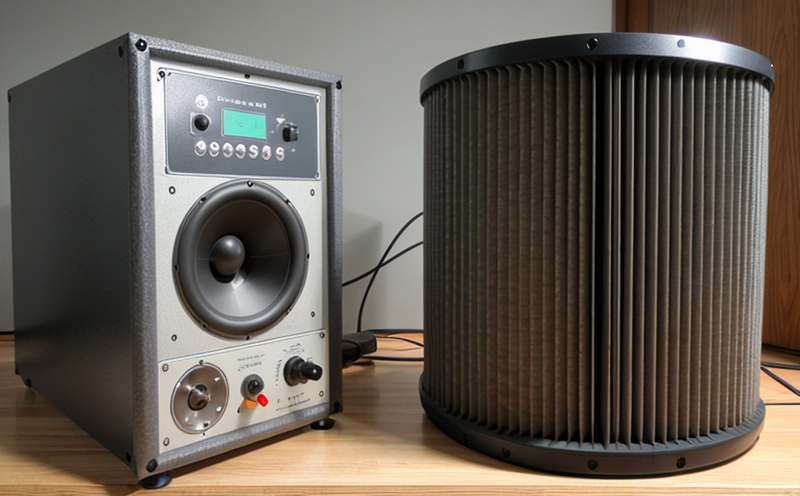ISO 11094 Measurement of Noise from Auxiliary Marine Machinery
The ISO 11094 standard provides a comprehensive framework for measuring noise emissions from auxiliary marine machinery. This service is crucial for ensuring that the machinery installed in ships and other marine vessels meets stringent environmental and compliance standards set by international maritime organizations.
ISO 11094 outlines specific procedures to measure and evaluate noise levels generated by various types of auxiliary equipment on board ships, including generators, pumps, compressors, and air conditioning units. The standard aims to minimize the impact of these noises on crew members' health and well-being, as excessive noise can lead to stress, sleep disturbances, and even hearing damage.
The testing process involves several key steps that ensure accurate measurement and assessment:
- Instrumentation Setup: A calibrated sound level meter is positioned at strategic locations around the machinery. These positions are determined by the standard to capture representative noise levels in different areas of the vessel.
- Measurement Conditions: The test is conducted under operational conditions that closely mimic real-world scenarios, ensuring that the measured noise levels reflect actual performance.
- Data Collection and Analysis: Noise data is collected over a specified period and analyzed to determine compliance with established limits. This analysis includes both peak and continuous sound level measurements.
- Reporting: A detailed report is generated, providing comprehensive results along with recommendations for any necessary adjustments or improvements.
The ISO 11094 standard also emphasizes the importance of minimizing noise emissions during design and manufacturing phases. By adhering to these guidelines early in the process, manufacturers can reduce the need for costly post-production modifications and ensure compliance from the outset. This not only benefits the environment but also enhances the overall quality of life aboard marine vessels.
Our laboratory has extensive experience in conducting ISO 11094 tests across a wide range of vessel types and sizes. From small pleasure crafts to large container ships, we have successfully completed numerous projects for leading shipyards, engine manufacturers, and shipping companies worldwide.
The benefits of adhering to the ISO 11094 standard extend beyond mere compliance; they contribute significantly to maintaining a healthy and productive work environment for crew members. Lower noise levels can lead to improved morale, reduced stress, and enhanced safety on board ships.
Benefits
The implementation of ISO 11094 noise testing offers numerous advantages for marine equipment manufacturers and shipowners:
- Compliance with International Standards: By meeting the requirements set forth in ISO 11094, companies ensure that their products comply with international maritime regulations.
- Enhanced Product Quality: Testing helps identify potential issues early in the development process, allowing for improvements before production begins.
- Cost Savings: Early detection of noise problems can prevent costly rework and warranty claims later on.
- Better Crew Comfort: Reduced noise levels contribute to a more pleasant working environment, which is essential for maintaining high crew satisfaction and productivity.
- Environmental Impact Reduction: Lowering noise emissions helps reduce the overall environmental footprint of marine operations.
- Improved Reputation: Compliance with international standards can enhance a company's reputation in the global market, leading to increased customer trust and loyalty.
- Regulatory Confidence: Demonstrating compliance through rigorous testing instills confidence among regulatory bodies, ensuring smoother operations during audits and inspections.
In summary, ISO 11094 noise testing is an essential step in the development and maintenance of marine equipment. It not only ensures compliance with international standards but also contributes to a healthier working environment and improved overall vessel performance.
Customer Impact and Satisfaction
The impact of ISO 11094 noise testing on customers is profound, touching various aspects of their operations:
- Enhanced Crew Well-being: Lower noise levels translate into a more comfortable living environment for crew members, leading to improved health and well-being.
- Increased Operational Efficiency: A quieter vessel can lead to better concentration and decision-making among the crew, enhancing overall operational efficiency.
- Improved Customer Relations: Compliance with international standards can significantly enhance customer trust and satisfaction, fostering long-term relationships.
- Economic Benefits: Reduced noise emissions can translate into lower fuel consumption and maintenance costs, contributing to significant economic savings for shipowners.
- Safety Improvements: A quieter vessel environment contributes to overall safety by reducing distractions and enhancing situational awareness among crew members.
- Environmental Stewardship: Lower noise emissions align with broader environmental goals, reinforcing the company's commitment to sustainability.
In conclusion, ISO 11094 noise testing plays a vital role in ensuring that marine equipment meets international standards while providing tangible benefits for both manufacturers and end-users. This service not only supports regulatory compliance but also contributes to a more efficient, safe, and environmentally responsible maritime industry.
Environmental and Sustainability Contributions
The measurement of noise from auxiliary marine machinery using ISO 11094 is closely tied to broader environmental sustainability efforts. By reducing noise emissions, this service supports several key objectives:
- Mitigation of Noise Pollution: Excessive noise can disrupt marine ecosystems and wildlife, leading to potential ecological imbalances.
- Enhanced Energy Efficiency: Quieter machinery often operates more efficiently, reducing energy consumption and greenhouse gas emissions.
- Support for Renewable Energies: By improving the efficiency of auxiliary systems, noise reduction can support the integration of renewable energy sources in marine operations.
- Promotion of Cleaner Technologies: Compliance with ISO 11094 encourages the development and adoption of cleaner technologies that are quieter and more sustainable.
- Reduction in Noise-Induced Health Issues: Lower noise levels contribute to a healthier environment for all individuals exposed to marine operations, including crew members and nearby communities.
- Sustainable Resource Management: By promoting efficient use of resources and minimizing waste, this service supports sustainable resource management practices within the maritime sector.
In summary, ISO 11094 noise testing is an integral part of a broader strategy to enhance environmental sustainability in the marine industry. It not only contributes to regulatory compliance but also supports long-term goals for cleaner technologies and more efficient operations.





